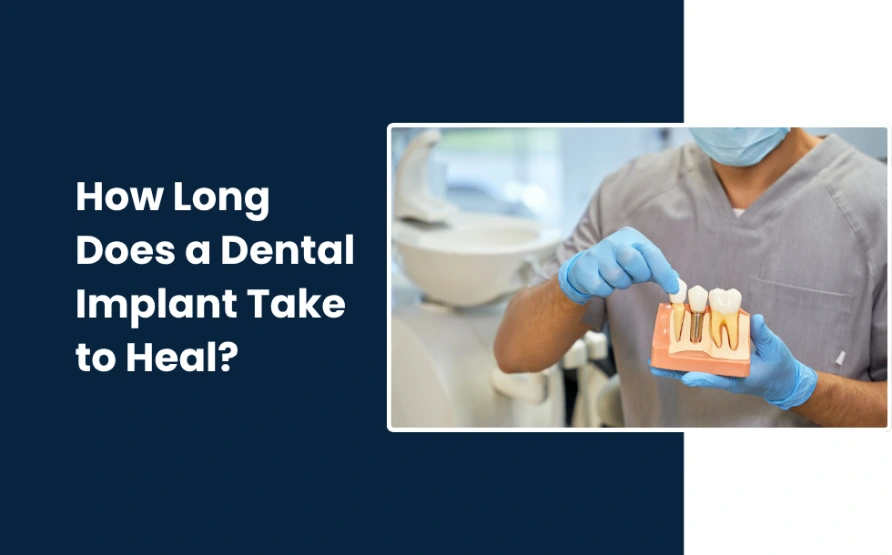The first thing most individuals are curious about before and after getting artificial tooth replacements is “How long does a dental implant take to heal?” Generally, the recovery time for this procedure is different for everyone, and if you think you will heal from it in a day, you are wrong.
Recovering from implant surgery doesn’t happen overnight; it’s a gradual process that allows your bone and gums to adapt to the new implant. The way your mouth heals determines how stable and long-lasting your restoration will be. We will walk you through the entire recovery process, from the healing timeline for each stage to the expert tips that help keep your new tooth in good condition for years.
How Long Does a Dental Implant Take to Heal?
It is the most reliable way to replace a missing tooth, but it’s not a one-day fix. Full recovery can take several weeks or months, depending on your oral health and the type of restoration. Healing occurs in stages, and each stage has its own timeline and function.
The implant must fuse with your jawbone through a process called osseointegration. This biological bonding creates a solid foundation for your crown, bridge, or denture and ensures the implant feels and functions like a natural tooth.

Dental Implant Healing Stages
The healing begins the moment the artificial tooth root is placed in your jawbone. Your body starts adapting to the titanium or zirconia post. Healing time can vary depending on where the implant is placed, implants in the upper jaw often take longer because the bone there is softer than in the lower jaw.
Initial Recovery (1 to 2 Weeks)
After surgery, you may experience mild pain, swelling, or gum tenderness. These symptoms usually peak within 48 hours and gradually improve by the end of the first week. Slight bleeding during the first day is normal and should stop quickly with proper care.
Stick to soft foods and maintain gentle oral hygiene to help your gums and bone begin healing properly. Most patients feel comfortable within two weeks of this phase.
Osseointegration Healing Phase (3 to 6 Months)
This is the most important stage of dental implant recovery. During this time, your jawbone naturally fuses with the implant post, forming a strong and durable base. Bone cells grow around the titanium surface, locking the post in place for long-term stability.
The dental implant stage 2 recovery can last anywhere from three to six months, depending on bone density, health, and lifestyle. Your dentist may place a temporary tooth so you can smile and eat comfortably while healing continues beneath the gums.
Important Tip: Avoid brushing the implant site for the first few days, do not smoke, and follow your dentist’s post-operative care instructions. These steps prevent infection and help the implant bond securely with your bone.
Abutment and Gum Tissue Healing (2 to 4 Weeks)
After osseointegration is complete, your dentist will attach an abutment, a connector that links the implant post with the crown. This minor procedure takes about two to four weeks to heal. During this time, gum tissue reshapes and tightens around the connector, giving it a natural appearance.
Some people feel mild gum sensitivity or soreness, which can be relieved with pain medication. Avoid hard or sticky foods, and rinse gently with saltwater to reduce inflammation and support healthy tissue growth.
Final Crown Placement (Little to No Recovery)
At your final appointment, the permanent crown is attached to the abutment. Recovery is minimal after this step, though your dentist may schedule a follow-up visit to ensure your bite feels natural and the crown fits perfectly. Once in place, you can eat and brush normally again.
Keep in mind, the overall healing stages are the same for single and full-mouth restorations. Full-mouth cases simply take longer because more implants are placed at once.
How to Help Dental Implants Heal Faster
Although recovery takes time, there are steps you can take to speed up healing and protect your new implant. Following these practical tips will help you recover comfortably and lower the risk of complications:
- Rest for the first 48 hours after surgery and avoid heavy physical activity.
- Eat soft foods like yoghurt, soup, and eggs until your gums feel comfortable.
- Brush carefully around the implant area and rinse twice daily with a mild saltwater solution.
- Avoid smoking and alcohol, as both delay bone and tissue healing.
- Attend all follow-up appointments so your dentist can monitor progress and make adjustments if needed.
These simple habits not only shorten recovery time but also improve the long-term success of your implant.
What Factors Affect the Implant Healing Time
The dental implant recovery timeline varies from one person to another. Several factors determine how long your mouth takes to fully heal after surgery.
- Number of implants: Replacing one tooth heals faster than multiple or full-mouth placements.
- Bone density and location: Implants placed in dense lower jawbone heal faster than those in softer upper bone.
- Additional procedures: Bone grafting or tooth extraction before surgery can add three to six months to the total healing period.
- Immediate-load or All-on-4 implants: These allow temporary teeth to be attached the same day, reducing recovery time to a few weeks before the final teeth are placed.
- Lifestyle and hygiene: Smoking, alcohol, or poor oral hygiene can delay healing and increase the risk of complications.
Your dentist will monitor healing through X-rays and follow-up visits before attaching the final crown. Following their instructions closely ensures the implant fuses properly and stays secure for decades.
Conclusion
If you’re planning to get dental implants, it’s important to understand that healing from this procedure takes time. You should know what to expect at every stage and follow aftercare guidelines for strong, long-lasting results. This guide outlines the full dental implant healing timeline and practical care tips to help you recover smoothly and maintain a healthy, natural-looking smile.
Related Guides:
- How Long After Dental Implants Can I Eat?
- How to Clean Dental Implants
- What Are Screwless Dental Implants?
FAQs
How long does it take to recover from a tooth implant?
Most patients recover from surgery in one to two weeks, but full healing takes about three to six months as the bone fuses with the implant.
How do I know if my dental implant is healing correctly?
If your gums are not swollen, bleeding, or painful, and you can chew comfortably, your implant is likely healing properly. Your dentist can confirm this with a quick checkup or X-ray.
How can I make my dental implant heal faster?
Follow your dentist’s aftercare instructions, rest well, eat soft foods, maintain good hygiene, and avoid smoking or heavy exercise. These habits promote faster and healthier healing.
Can I eat normally after a dental implant?
You can begin eating soft foods within a few days, but avoid biting hard or sticky foods until your dentist confirms the implant has fully integrated.
What slows down dental implant healing?
Smoking, alcohol, uncontrolled diabetes, or poor oral hygiene can all slow recovery. Consistent care and regular dental visits help prevent these delays.

